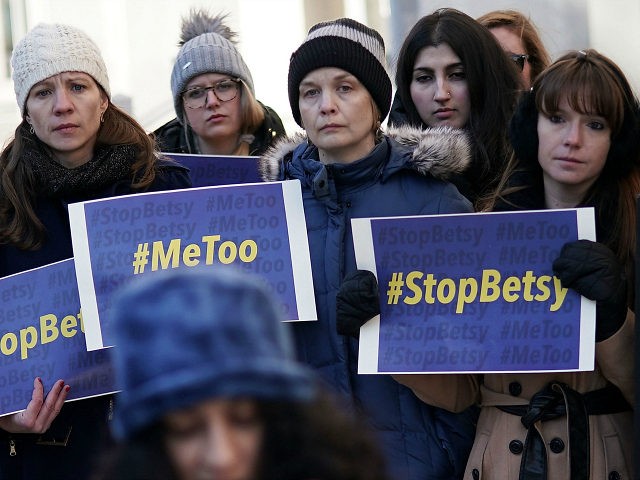The U.S. District Court for the District of Columbia rejected an attempt by a coalition of 18 Democrat attorneys general to block the Trump administration’s new Title IX rule that governs campus sexual misconduct.
The court denied the Democrats’ motion for a preliminary injunction Wednesday, allowing the rule to take effect on Friday.
U.S. Secretary of Education Betsy DeVos said in a statement:
Today’s ruling is yet another victory for students and reaffirms that students’ rights under Title IX go hand in hand with basic American principles of fairness and due process. With yet another failed attempt to block our historic Title IX Rule, we can now look forward to it taking effect this Friday, requiring schools to act in meaningful ways to support survivors of sexual misconduct without sacrificing important safeguards to protect free speech and provide all students with a transparent, reliable process. We can and must continue to fight sexual misconduct in our nation’s schools, and today’s ruling will help ensure that happens.
The Democrat attorneys general filed the lawsuit in June to block the new rule that requires due process for those accused of campus sexual misconduct.
Led by Attorneys General Xavier Becerra (CA), Josh Shapiro (PA), and Gurbir Grewal (NJ), the Democrats claimed the Title IX rule, which seeks to “balance the scales of justice” in specifying how schools must handle allegations of sexual misconduct, will undermine the rule’s purpose of preventing sex discrimination.
The lawsuit claimed the rule would remove protections from sexual harassment and “reverse decades of effort to end the corrosive effects of sexual harassment on equal access to education.”
U.S. Education Secretary Betsy DeVos said in an interview in May on SiriusXM’s Breitbart News Daily that the new rule is a win for both alleged victims of sexual misconduct and the accused.
Some of the new features of the rule include spelling out alleged victims’ right to supportive services, such as class or dorm changes, and an option to file a formal complaint.
Those accused of sexual misconduct will not be presumed guilty, according to the new rule. They will be entitled to written notice of allegations, the right to an advocate, and the right to cross-examination, which had been denied them in the past.
The rule also specifies how schools that receive federal financial aid are required to respond to allegations of sexual misconduct.
Many Democrats and feminist groups used the already debunked Obama-era “1 in 5” statistic to urge opposition to the proposed rule. The stat refers to the notion that “one in five women experience sexual assault or attempted assault while in college.”
However, that indicator — spread widely by the Obama administration through its Centers for Disease Control and Prevention (CDC) and used in multiple sexual harassment courses required of college students throughout the nation — is “wildly at odds with the official crime statistics,” said American Enterprise Institute (AEI) resident scholar and former philosophy professor Christina Hoff Sommers.
According to the Bureau of Justice Statistics, a division of the Department of Justice (DOJ), the actual rate of sexual assault on college campuses, is 6.1 per 1,000 students, or .03 per 5. The rate of rape and sexual assault for nonstudents is actually 1.2 times higher than for students — 7.6 per 1,000. Sommers asked:
Where did the CDC find more than a million and nearly 14 million victims of sexual violence that professional criminologists somehow overlooked? It found them by using a poorly constructed telephone survey with a low response rate and a non-representative sample of respondents. No one interviewed was asked if they had been raped or sexually assaulted.
Armed with the false “1 in 5” statistic, however, the Obama administration threatened to cut funding to colleges and universities that did not implement its policy.
Three federal courts have already determined students accused of sexual misconduct were not provided with due process in the cases decided on campus.
For example, in June 2019, Judge Amy Coney Barrett of the U.S. Court of Appeals for the Seventh Circuit in Chicago led a unanimous, all-women panel of judges in reversing a lower court’s decision to dismiss a college student’s claim that his right to due process was not honored and that he was discriminated against because of his sex in a campus sex assault investigation.
In her decision in Doe v. Purdue University, Barrett, a Donald Trump appointee, observed “John Doe” had “adequately alleged” Purdue University violated his Fourteenth Amendment rights “by using constitutionally flawed procedures to determine his guilt or innocence” and that the school had violated Title IX “by imposing a punishment infected by sex bias.”
Barrett added that the evidence in the case suggests the Purdue Advisory Committee “decided that John was guilty based on the accusation rather than the evidence.”

COMMENTS
Please let us know if you're having issues with commenting.